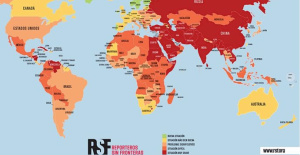MADRID, 22 Abr. (EUROPA PRESS) -
The digital economy directly, indirectly and inducedly represented 24.2% of the Spanish gross domestic product (GDP) in 2023, which represents an increase of 1.5 percentage points compared to the 22.7% weight it had in 2022. , and its impact reached 353,000 million euros, 16% more than the 304,200 million euros of the previous year, according to the latest edition of the 'Digital Economy Report' prepared by Adigital and Boston Consulting Group.
This increase in the weight of the digital economy in the national GDP is attributed to a "strong growth in digitalization", something that, according to Adigital, brings the country closer to the goal of reaching a GDP digitalization level of 40% in 2030.
Specifically, the report estimates the value generated by the digitalization of the economy through the aggregation of its direct (12.3%), indirect (11.1%) and induced (0.8%) impact on GDP.
"The acceleration of digitalization is great news since it returns Spain to the path of strong growth in the digital economy (...) We must keep in mind that digitalization drives the growth of the economy as a whole, increases productivity and has a significant impact on social well-being," highlighted in this context the president of Boston Consulting Group in Iberia, Rafael Rilo.
Likewise, the Secretary of State for Digitalization and Artificial Intelligence, Mayte Ledo, participated in the presentation of the report, highlighting the "maturity" of the digital economy in Spain.
The study also addresses the impact of generative artificial intelligence (AI) and its potential to boost Spanish economic growth by increasing productivity, in line with its recognition by the European Union as a strategic technology.
Regarding this, the authors of the report point out that the integration of AI poses "significant challenges", especially in terms of ethics, privacy and security, something that, in their opinion, can slow down its development and adoption.
Along these lines, the document states that 42% of companies claim that they do not implement generative AI because they do not have a strategy for its responsible use.
"Responsible AI allows the dissemination and institutionalization of this technology throughout companies and public administrations," highlighted the general director of Adigital, César Tello.
"The incorporation of responsible AI criteria translates into a competitive advantage since it allows early compliance with regulations, increasing consumer confidence and optimizing the acquisition and retention of talent," he added.
Another aspect that the analysis addresses is how the regulatory framework and public policies in the European Union, the United States and China are influencing the advancement of digitalization.
To maximize the opportunities offered by AI and not slow down innovation, digitalization and the growth of European companies, the report offers ten recommendations, including the creation of a new governance model for digital regulation, the promotion of use of open data, the maintenance of cybersecurity as a "fundamental pillar" and the commitment to financing telecommunications infrastructure.
Likewise, the importance of strengthening public-private collaboration and planning adequate governance to guarantee competitiveness, innovation and consumer protection in companies is highlighted.

 Exploring Cardano: Inner Workings and Advantages of this Cryptocurrency
Exploring Cardano: Inner Workings and Advantages of this Cryptocurrency Seville.- Economy.- Innova.- STSA inaugurates its new painting and sealing hangar in San Pablo, for 18 million
Seville.- Economy.- Innova.- STSA inaugurates its new painting and sealing hangar in San Pablo, for 18 million Innova.- More than 300 volunteers join the Andalucía Compromiso Digital network in one month to facilitate access to ICT
Innova.- More than 300 volunteers join the Andalucía Compromiso Digital network in one month to facilitate access to ICT Innova.-AMP.- Ayesa acquires 51% of Sadiel, which will create new technological engineering products and expand markets
Innova.-AMP.- Ayesa acquires 51% of Sadiel, which will create new technological engineering products and expand markets Spain moves from 36th to 30th place in RSF's world press freedom ranking but political pressure increases
Spain moves from 36th to 30th place in RSF's world press freedom ranking but political pressure increases Spain receives 16.1 million tourists until March and registers the best first quarter in history
Spain receives 16.1 million tourists until March and registers the best first quarter in history More than 2,000 arrested during pro-Palestinian protests at US universities
More than 2,000 arrested during pro-Palestinian protests at US universities Illa advocates for a "transversal" Government and Junts rules out agreeing with the socialists
Illa advocates for a "transversal" Government and Junts rules out agreeing with the socialists How Blockchain in being used to shape the future
How Blockchain in being used to shape the future Not just BTC and ETH: Here Are Some More Interesting Coins Worth Focusing on
Not just BTC and ETH: Here Are Some More Interesting Coins Worth Focusing on UPV students design an app that helps improve the ventilation of homes in the face of high temperatures
UPV students design an app that helps improve the ventilation of homes in the face of high temperatures Ivace and promotes a less invasive device for the early detection of prostate cancer
Ivace and promotes a less invasive device for the early detection of prostate cancer Valencia unanimously approves the ordinance to allocate spaces to test innovative initiatives
Valencia unanimously approves the ordinance to allocate spaces to test innovative initiatives UPV researchers promote a paid master's degree as a "talent factory" in integrated photonics
UPV researchers promote a paid master's degree as a "talent factory" in integrated photonics A million people demonstrate in France against Macron's pension reform
A million people demonstrate in France against Macron's pension reform Russia launches several missiles against "critical infrastructure" in the city of Zaporizhia
Russia launches several missiles against "critical infrastructure" in the city of Zaporizhia A "procession" remembers the dead of the Calabria shipwreck as bodies continue to wash up on the shore
A "procession" remembers the dead of the Calabria shipwreck as bodies continue to wash up on the shore Prison sentences handed down for three prominent Hong Kong pro-democracy activists
Prison sentences handed down for three prominent Hong Kong pro-democracy activists ETH continues to leave trading platforms, Ethereum balance on exchanges lowest in 3 years
ETH continues to leave trading platforms, Ethereum balance on exchanges lowest in 3 years Investors invest $450 million in Consensys, Ethereum incubator now valued at $7 billion
Investors invest $450 million in Consensys, Ethereum incubator now valued at $7 billion Alchemy Integrates Ethereum L2 Product Starknet to Enhance Web3 Scalability at a Price 100x Lower Than L1 Fees
Alchemy Integrates Ethereum L2 Product Starknet to Enhance Web3 Scalability at a Price 100x Lower Than L1 Fees Mining Report: Bitcoin's Electricity Consumption Declines by 25% in Q1 2022
Mining Report: Bitcoin's Electricity Consumption Declines by 25% in Q1 2022 Oil-to-Bitcoin Mining Firm Crusoe Energy Systems Raised $505 Million
Oil-to-Bitcoin Mining Firm Crusoe Energy Systems Raised $505 Million Microbt reveals the latest Bitcoin mining rigs -- Machines produce up to 126 TH/s with custom 5nm chip design
Microbt reveals the latest Bitcoin mining rigs -- Machines produce up to 126 TH/s with custom 5nm chip design Bitcoin's Mining Difficulty Hits a Lifetime High, With More Than 90% of BTC Supply Issued
Bitcoin's Mining Difficulty Hits a Lifetime High, With More Than 90% of BTC Supply Issued The Biggest Movers are Near, EOS, and RUNE during Friday's Selloff
The Biggest Movers are Near, EOS, and RUNE during Friday's Selloff Global Markets Spooked by a Hawkish Fed and Covid, Stocks and Crypto Gain After Musk Buys Twitter
Global Markets Spooked by a Hawkish Fed and Covid, Stocks and Crypto Gain After Musk Buys Twitter Bitso to offset carbon emissions from the Trading Platform's ERC20, ETH, and BTC Transactions
Bitso to offset carbon emissions from the Trading Platform's ERC20, ETH, and BTC Transactions Draftkings Announces 2022 College Hoops NFT Selection for March Madness
Draftkings Announces 2022 College Hoops NFT Selection for March Madness























